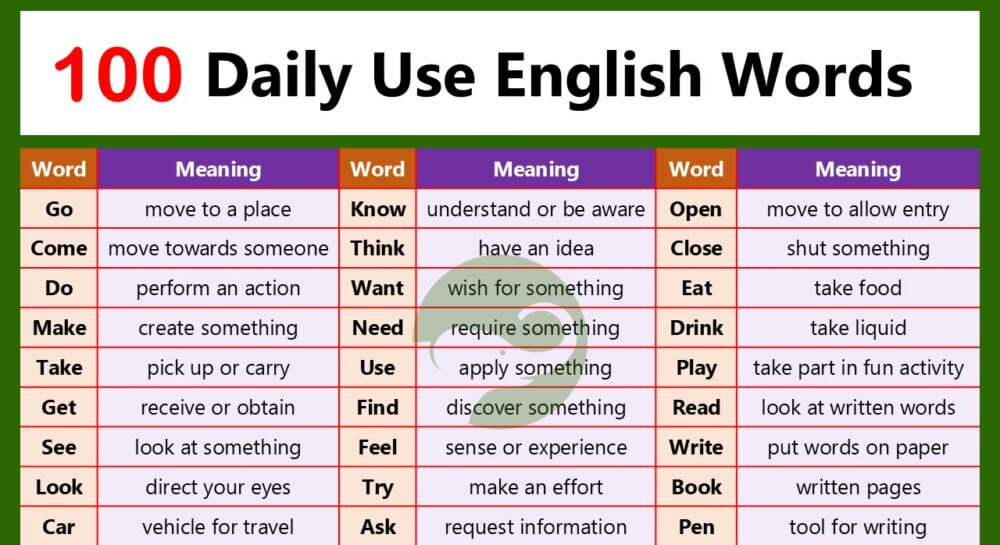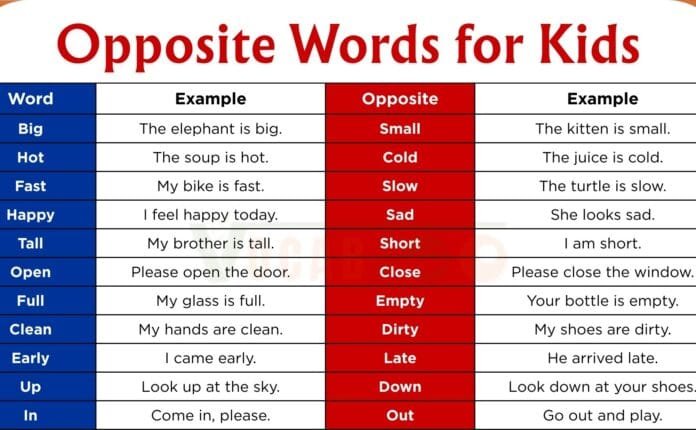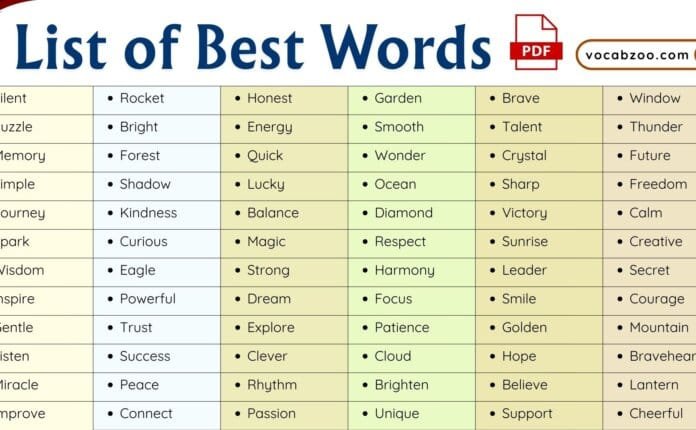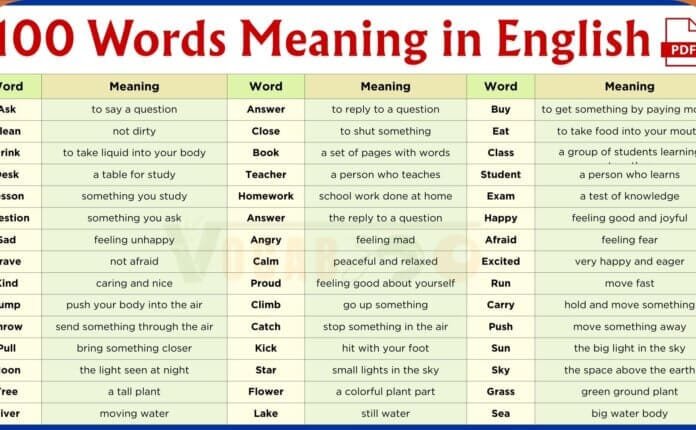Everyday conversations become easier when you know the right words. In this blog post, you will find 100 daily use English words with meaning and examples. Learning these words helps you understand what people say, express yourself clearly, and write sentences that make sense. By practicing these words in daily life, you can improve your English skills in speaking, reading, listening, and writing, and become more confident in using the language every day.
What Are Daily Use English Words?
Daily use English words are common words that people use every day in speaking and writing. They help you build clear sentences and express basic ideas. These words are used at home, school, work, shops, and in simple communication.
Daily words are usually:
- easy to learn
- simple to pronounce
- used in many contexts
- important for beginners and growing learners
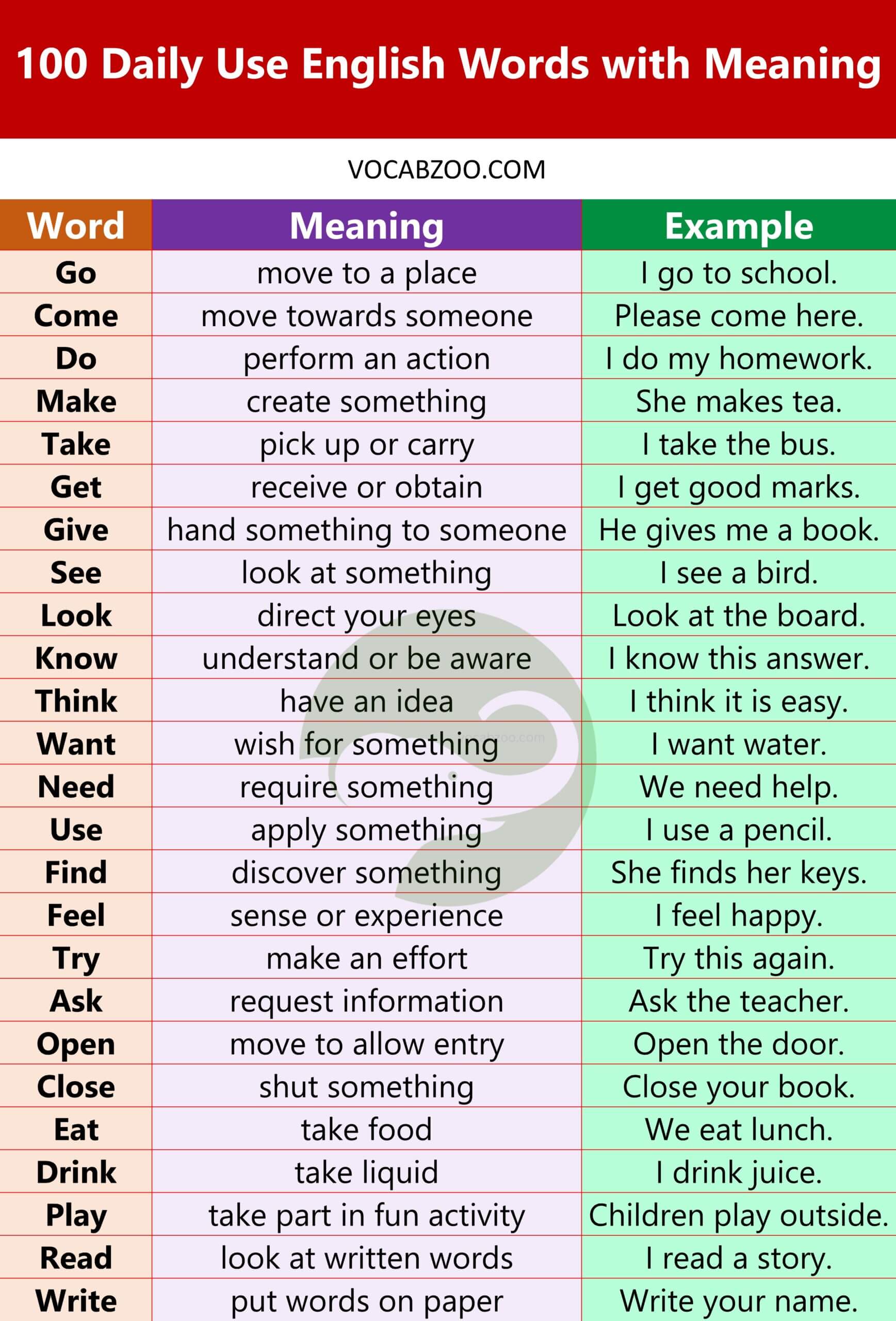
Why Learning Daily Words Is Helpful
Learning these words helps you:
- speak more confidently
- understand simple conversations
- read faster
- write clear sentences
- build a strong base for advanced vocabulary
Using short and meaningful words makes communication smooth and effective.
100 Daily Use English Words with Meaning
Here’s the list of 100 daily used English words with meanings:
- Go: move from one place to another
- Come: move towards someone
- Do: perform an action
- Make: create or prepare
- Take: pick up or accept
- Get: receive or obtain
- Give: hand something to someone
- See: notice with eyes
- Look: direct your eyes
- Know: understand or realise
- Think: have an idea or opinion
- Want: wish for something
- Need: require something
- Use: apply or operate
- Find: discover something
- Feel: sense an emotion
- Try: make an effort
- Ask: request information
- Open: allow access
- Close: shut something
- Eat: take food
- Drink: take liquid
- Play: take part in fun activity
- Read: look at written words
- Write: put words on paper
- Home: place where you live
- House: building for living
- School: place for learning
- Teacher: person who teaches
- Student: person who learns
- Friend: person you like
- Family: related people
- Food: things we eat
- Water: liquid for drinking
- Room: part of a building
- Bag: object for carrying things
- Book: written pages
- Pen: writing tool
- Car: vehicle for travel
- Shop: place to buy things
- Table: flat surface with legs
- Chair: seat with back
- Clothes: things we wear
- Street: road in a town
- City: large town
- Morning: early part of day
- Night: dark part of day
- Money: currency used to buy
- Job: work you do
- Time: moment or hour
- Big: large in size
- Small: little in size
- Long: not short
- Short: not long
- Good: nice or helpful
- Bad: not good
- Easy: not difficult
- Hard: difficult
- New: not old
- Old: not new
- Clean: without dirt
- Dirty: not clean
- Happy: feeling joy
- Sad: feeling unhappy
- Fast: quick in speed
- Slow: not fast
- Early: before the usual time
- Late: after the usual time
- Hot: high temperature
- Cold: low temperature
- Strong: having power
- Weak: not strong
- Nice: pleasant or kind
- Busy: having many tasks
- Quiet: without noise
- Today: this day
- Yesterday: the day before
- Tomorrow: the next day
- Now: at this moment
- Before: earlier time
- After: later time
- Here: in this place
- There: in that place
- Inside: in the inner part
- Outside: not inside
- Right: direction or correct
- Left: opposite of right
- Up: higher position
- Down: lower position
- Near: close by
- And: joins two ideas
- But: shows contrast
- Or: gives choice
- Because: gives reason
- With: together or having
- Without: not having
- About: concerning something
- For: purpose or benefit
- From: point of origin
- To: shows direction
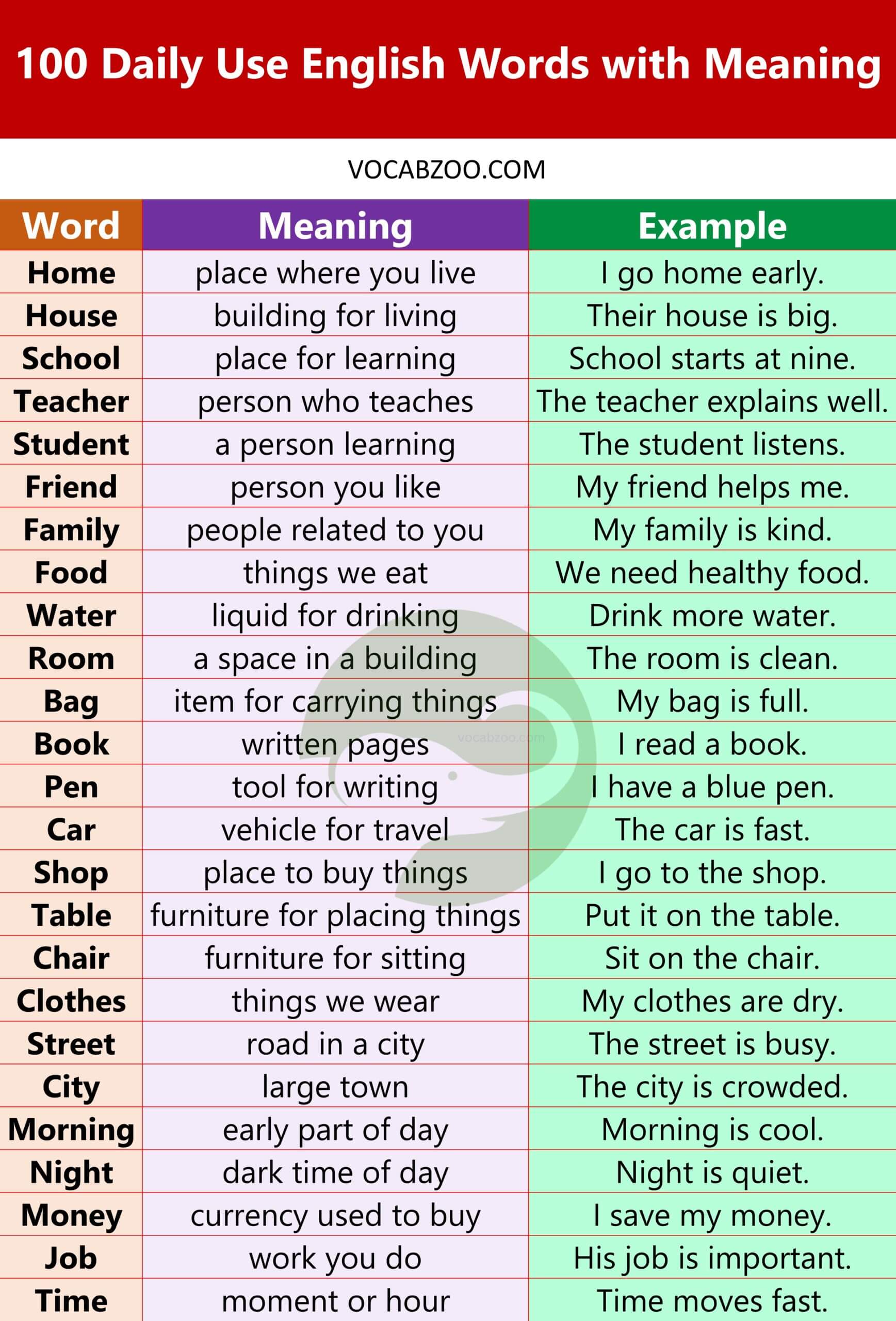
Daily Use English Words with Examples
To make learning easier, the 100 words are divided into useful groups.
Action Words
| Word | Meaning | Example |
|---|---|---|
| go | move to a place | I go to school. |
| come | move towards someone | Please come here. |
| do | perform an action | I do my homework. |
| make | create something | She makes tea. |
| take | pick up or carry | I take the bus. |
| get | receive or obtain | I get good marks. |
| give | hand something to someone | He gives me a book. |
| see | look at something | I see a bird. |
| look | direct your eyes | Look at the board. |
| know | understand or be aware | I know this answer. |
| think | have an idea | I think it is easy. |
| want | wish for something | I want water. |
| need | require something | We need help. |
| use | apply something | I use a pencil. |
| find | discover something | She finds her keys. |
| feel | sense or experience | I feel happy. |
| try | make an effort | Try this again. |
| ask | request information | Ask the teacher. |
| open | move to allow entry | Open the door. |
| close | shut something | Close your book. |
| eat | take food | We eat lunch. |
| drink | take liquid | I drink juice. |
| play | take part in fun activity | Children play outside. |
| read | look at written words | I read a story. |
| write | put words on paper | Write your name. |
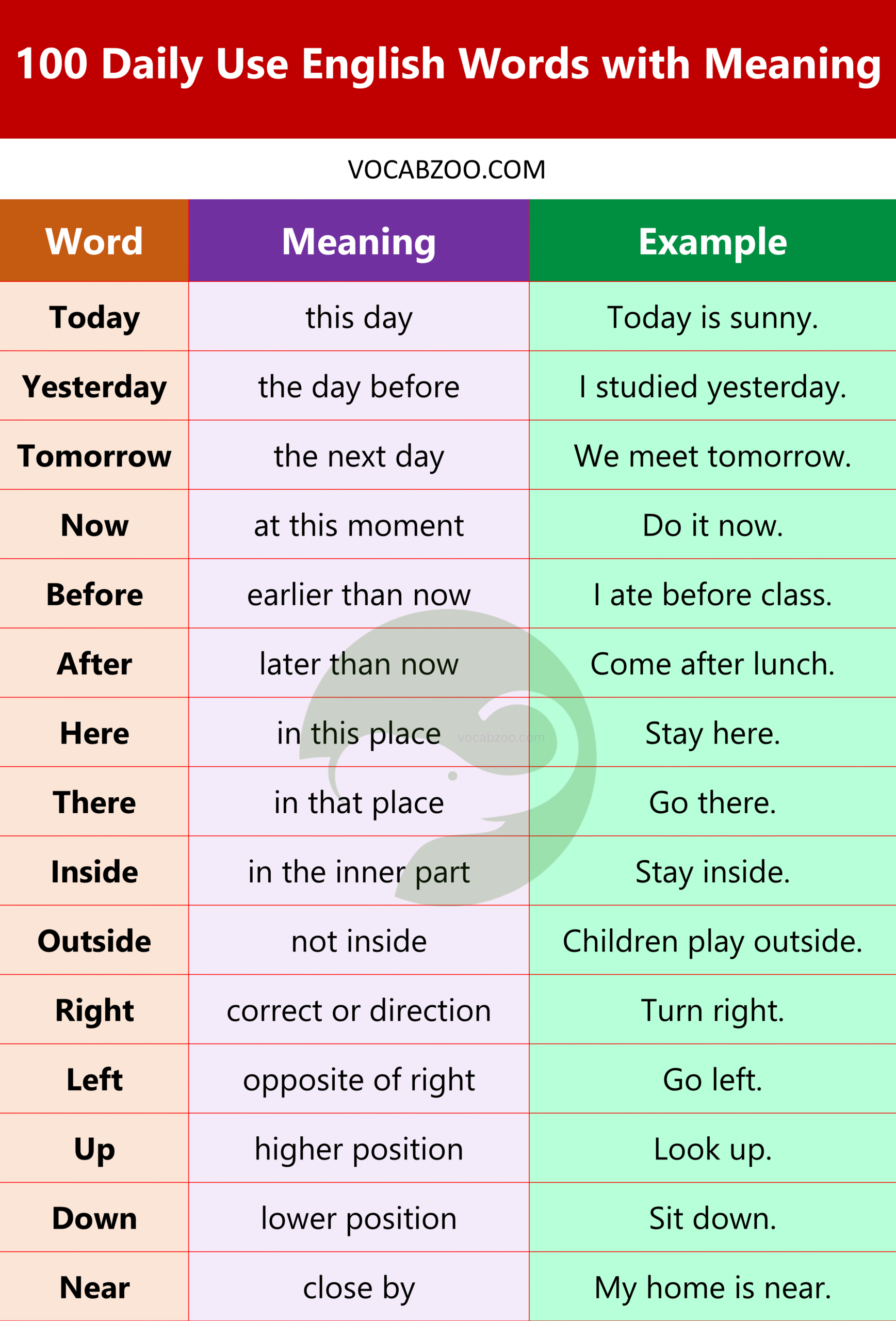
Everyday Naming Words
| Word | Meaning | Example |
|---|---|---|
| home | place where you live | I go home early. |
| house | building for living | Their house is big. |
| school | place for learning | School starts at nine. |
| teacher | person who teaches | The teacher explains well. |
| student | a person learning | The student listens. |
| friend | person you like | My friend helps me. |
| family | people related to you | My family is kind. |
| food | things we eat | We need healthy food. |
| water | liquid for drinking | Drink more water. |
| room | a space in a building | The room is clean. |
| bag | item for carrying things | My bag is full. |
| book | written pages | I read a book. |
| pen | tool for writing | I have a blue pen. |
| car | vehicle for travel | The car is fast. |
| shop | place to buy things | I go to the shop. |
| table | furniture for placing things | Put it on the table. |
| chair | furniture for sitting | Sit on the chair. |
| clothes | things we wear | My clothes are dry. |
| street | road in a city | The street is busy. |
| city | large town | The city is crowded. |
| morning | early part of day | Morning is cool. |
| night | dark time of day | Night is quiet. |
| money | currency used to buy | I save my money. |
| job | work you do | His job is important. |
| time | moment or hour | Time moves fast. |
Describing Words
| Word | Meaning | Example |
|---|---|---|
| big | large in size | The room is big. |
| small | little in size | She has a small bag. |
| long | not short | The line is long. |
| short | not long | The test is short. |
| good | nice or helpful | It is a good idea. |
| bad | not good | That is a bad habit. |
| easy | not difficult | The lesson is easy. |
| hard | difficult | The task is hard. |
| new | not old | I got a new phone. |
| old | not new | His shoes are old. |
| clean | without dirt | The floor is clean. |
| dirty | not clean | The table is dirty. |
| happy | feeling joy | I feel happy. |
| sad | unhappy feeling | She looks sad. |
| fast | moves quickly | The train is fast. |
| slow | not fast | The bus is slow. |
| early | before the usual time | I wake up early. |
| late | after the usual time | He is late today. |
| hot | high temperature | The soup is hot. |
| cold | low temperature | The water is cold. |
| strong | having power | He is strong. |
| weak | not strong | I feel weak today. |
| nice | pleasant | You look nice. |
| busy | having many tasks | She is very busy. |
| quiet | without noise | The library is quiet. |
Time and Place Words
| Word | Meaning | Example |
|---|---|---|
| today | this day | Today is sunny. |
| yesterday | the day before | I studied yesterday. |
| tomorrow | the next day | We meet tomorrow. |
| now | at this moment | Do it now. |
| before | earlier than now | I ate before class. |
| after | later than now | Come after lunch. |
| here | in this place | Stay here. |
| there | in that place | Go there. |
| inside | in the inner part | Stay inside. |
| outside | not inside | Children play outside. |
| right | correct or direction | Turn right. |
| left | opposite of right | Go left. |
| up | higher position | Look up. |
| down | lower position | Sit down. |
| near | close by | My home is near. |
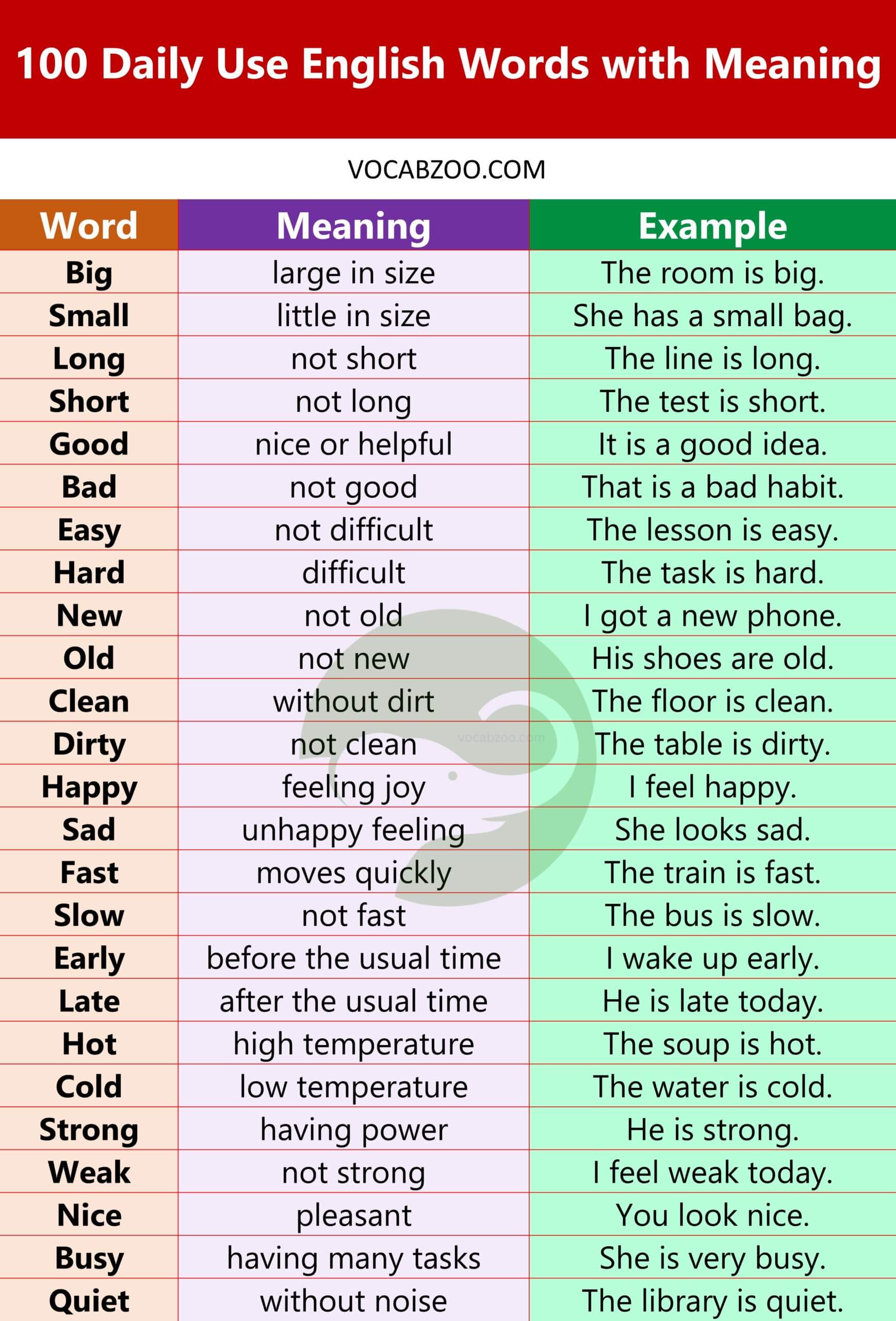
Tips for Fast Vocabulary Practice
- Review 10 words a day.
- Use each word in short sentences.
- Read simple stories to see these words in real use.
- Practise speaking with a partner or in front of a mirror.
- Try writing 5 easy sentences daily using new words.
These 100 daily use English words build a strong base for speaking, reading, and writing. The simple meanings and clear examples help learners understand and remember quickly. With regular practice, these words will become a natural part of your everyday communication.
FAQs
What are daily use English words?
Daily use English words are simple, common words used in everyday speaking and writing. They help learners communicate basic ideas clearly.
Why should I learn daily use English words?
Learning daily words improves speaking, reading, and understanding. These words appear in normal conversations, school lessons, and daily communication.
How many daily use words do beginners need?
Beginners should learn at least 100–200 daily use words. This makes it easier to form simple sentences and understand basic conversations.
Are daily use words easy to remember?
Yes. Daily use words are short, simple, and often repeated in everyday life, which makes them easier to learn and remember.
How can I practise daily use English words?
Practise by reading short sentences, speaking the words aloud, and writing a few sentences each day. Repetition helps build memory.
Can daily use English words improve my speaking?
Yes. Using common words helps you speak clearly and confidently. These words form the base of natural conversation.
Are daily use English words useful for all ages?
Yes. Children, students, and adults all use these words daily. They are helpful for anyone learning basic English.
Read More
